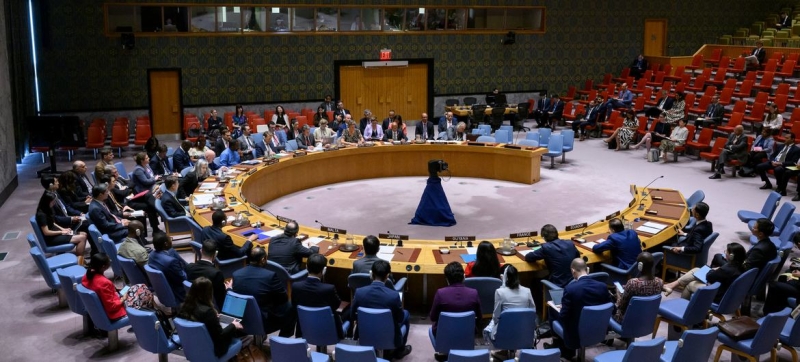
UN Security Council meeting. UN: DPRK actively working to expand its military capabilities Peace and security
Missile launches, nuclear program and military cooperation with Russia – Under-Secretary-General for Political and Peacebuilding Affairs Rosemary DiCarlo briefed the Security Council on Wednesday on the situation related to the Democratic People’s Republic of Korea (DPRK) at the request of UN member states.
North Korea’s Military Programs
“The DPRK is actively working to expand its military capabilities under the five-year military development plan unveiled in January 2021,” DiCarlo said. She noted that in 2024, the DPRK launched one intercontinental ballistic missile (ICBM), four intermediate-range ballistic missiles, and several short-range missiles, as well as attempted to launch a military reconnaissance satellite. Some of the launches involved testing “hypersonic guided warheads” and “multiple-warhead missiles,” she said.
She drew attention to the solid-fuel Hwasong-19 missile, which was launched for the first time on October 31 and was the centerpiece of a recent arms exhibition in Pyongyang. “This missile set new records for the duration and altitude of any DPRK ICBM launch,” DiCarlo added.
Nuclear Facilities and Uranium Enrichment
She also touched on the development of the DPRK nuclear program. “In September, DPRK state media reported that the country’s leader inspected a ‘uranium enrichment base,’ confirming earlier reports of a second, as yet undeclared, uranium enrichment facility at Kansong, in addition to the Yongbyon facility,” the UN spokeswoman noted.
The Director General of the International Atomic Energy Agency (IAEA), according to her, reported that the 5-megawatt reactor in Yongbyon was not operating between mid-August and mid-October. “This period of time, according to IAEA experts, could have been used to refuel the reactor and begin its seventh operational cycle,” she specified.
“The development of the DPRK’s nuclear and missile programs undermines the global regime of nuclear disarmament and non-proliferation,” the speaker emphasized.
Cooperation with Russia
She also focused on reports “about growing military cooperation between the DPRK and Russia.” “According to media reports, North Korea has transferred more than 13,000 containers of ammunition, missiles and artillery to the Russian Federation since 2023,” DiCarlo said. She said these include 170mm self-propelled guns and 240mm multiple launch rocket systems. Russian forces have reportedly used North Korean-made short-range missiles in strikes against Ukraine.
The press also reported, the UN representative continued, that more than 10,000 North Korean troops had been sent to Russia, where they were undergoing training and receiving equipment. “According to official statements by the United States and Ukraine, these troops were deployed in the Kursk region of Russia and were participating in combat operations on the side of the Russian troops,” she emphasized.
International Obligations and Resolutions
DiCarlo recalled that “international interaction with the DPRK is determined by Security Council resolutions.” She especially emphasized that these resolutions are legally binding on all UN member states. “Any relations between countries and the DPRK must be carried out in compliance with Security Council sanctions,” she said.
“In accordance with these resolutions, the DPRK must stop exporting all types of weapons and related materials, and all Member States are obliged to prohibit their citizens from purchasing them from the DPRK,” the spokesperson added.
A Call for Diplomacy
DiCarlo called for renewed diplomatic efforts: “Diplomatic engagement remains the only path to sustainable peace and the complete and verifiable denuclearization of the Korean Peninsula.”
“We are deeply concerned about the rising tensions on the Korean Peninsula, which have increasingly global implications,” she said. “The Council needs to act decisively to uphold the non-proliferation regime and international norms.”
